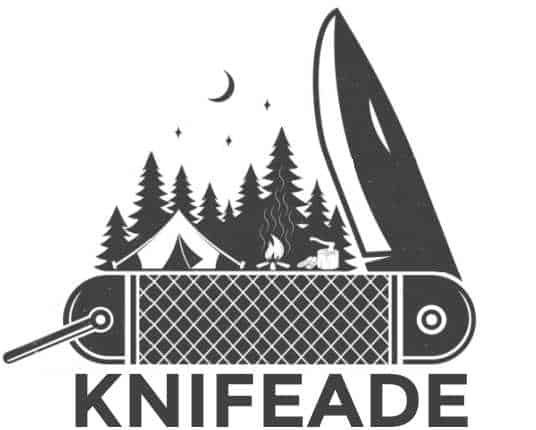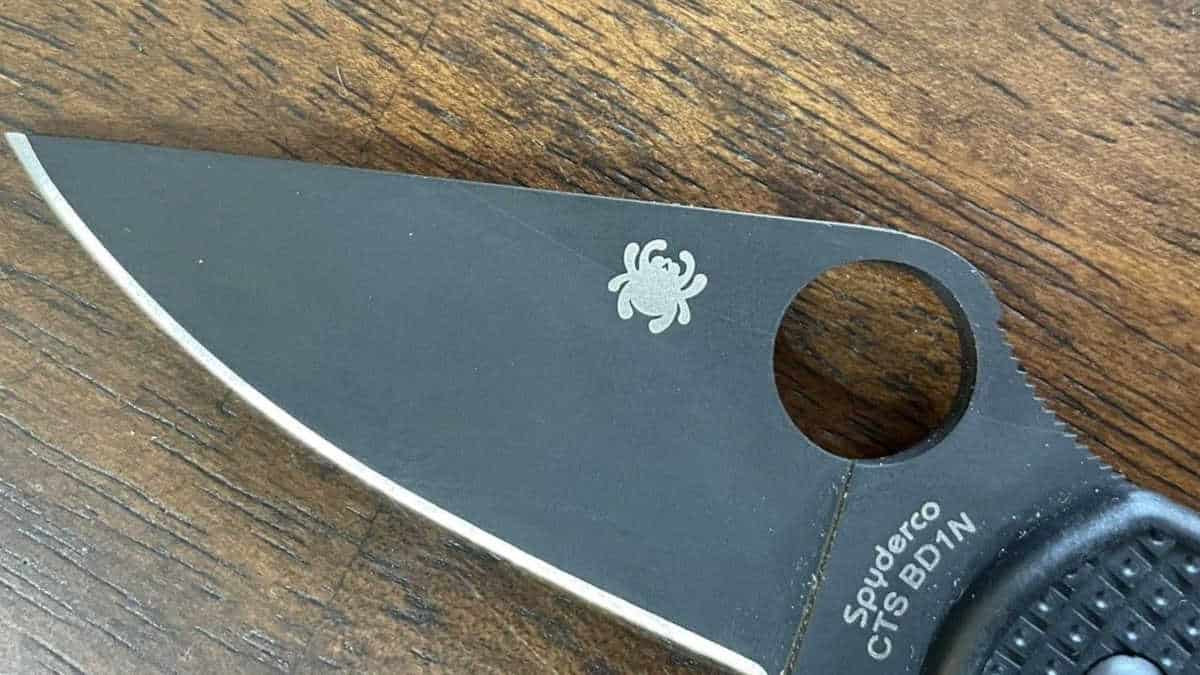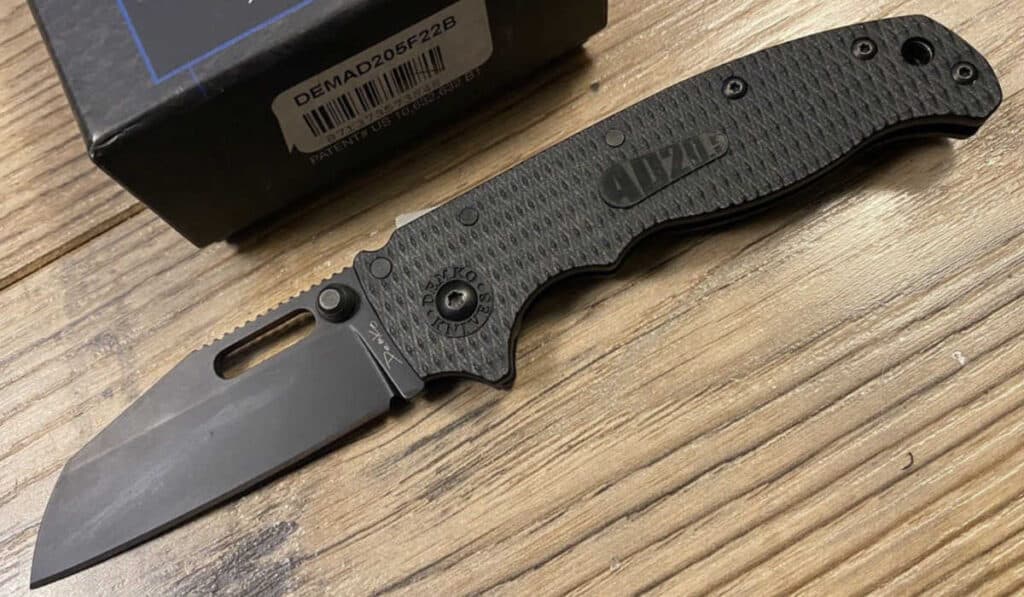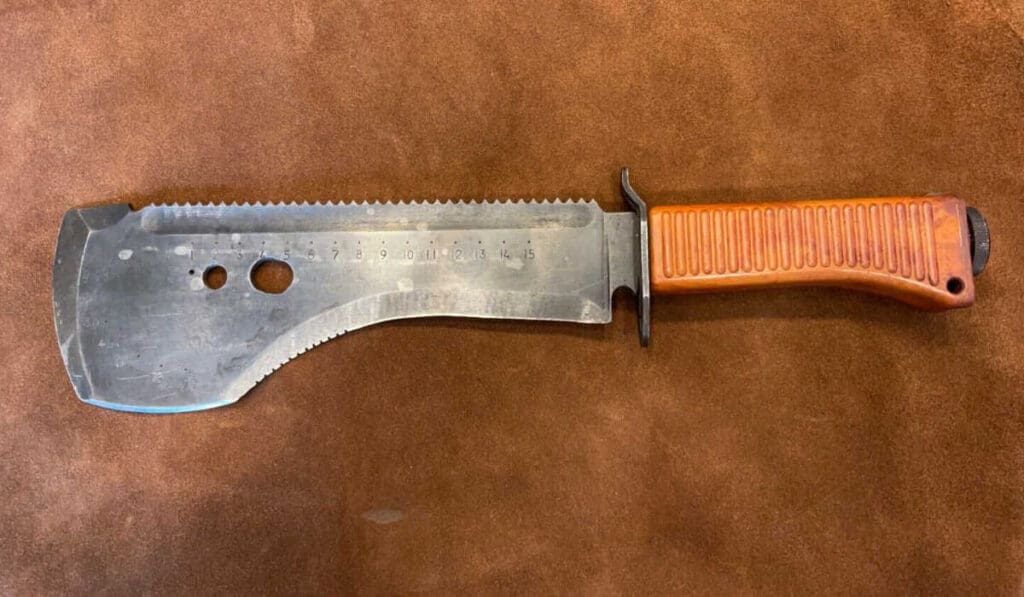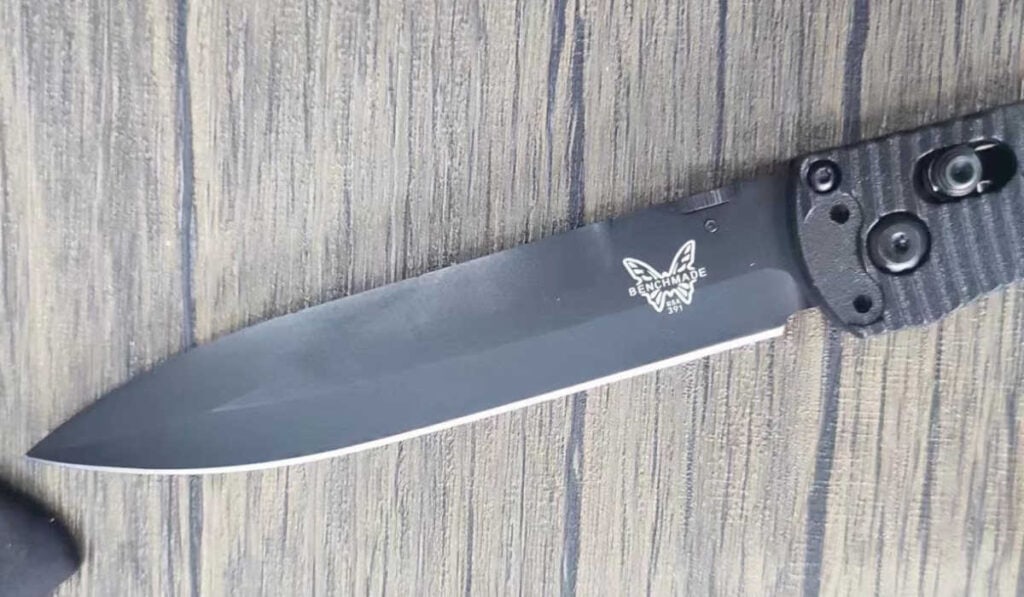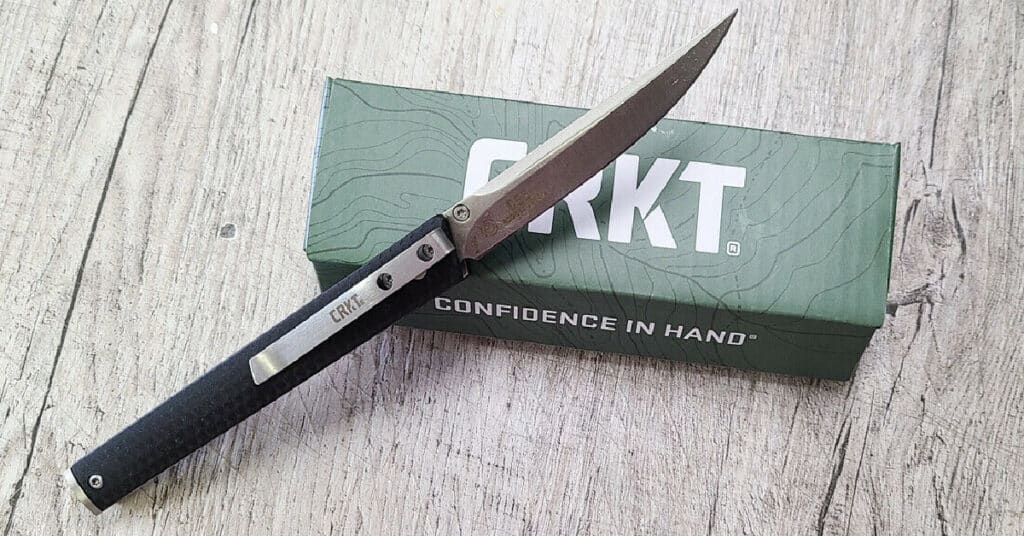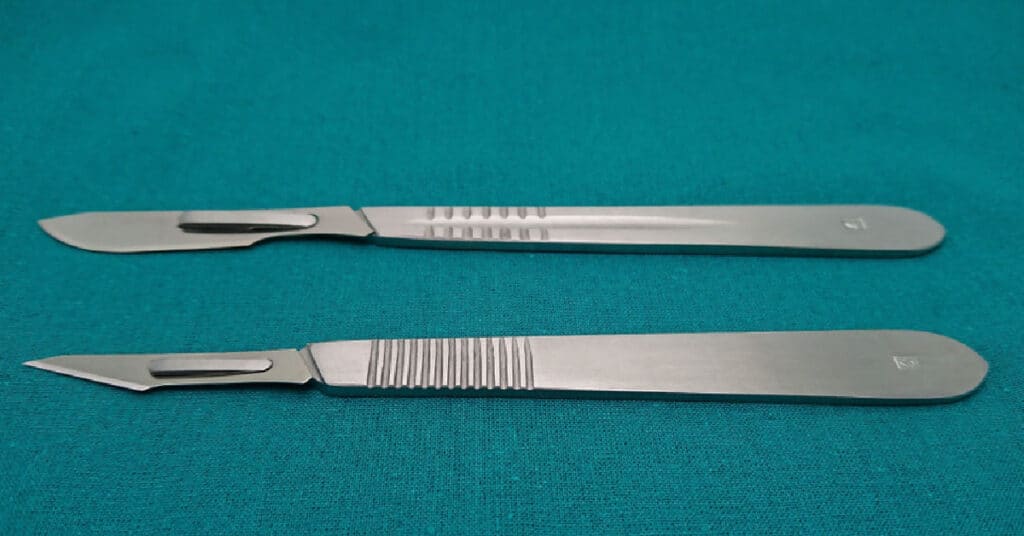As an Amazon Associate I earn from qualifying purchases.
At A Glance
CTS BD1N is a reputable choice for knife steel, known for its excellent performance and affordability. Manufactured by Carpenter Technology Corporation, this stainless steel offers a balanced composition that supports edge retention and a well-finished appearance. Although not comparable to high-end steels such as S30V or S90V, its performance is often likened to 440C steel. With its unique blend of wear and corrosion resistance, CTS BD1N steel ensures efficient and reliable use of knives made from it. This versatility, coupled with its durability, makes CTS BD1N a solid selection for those seeking an affordable, yet reliable knife steel. It is suitable for various knife applications, including everyday carry knives, pocket knives, kitchen knives, and camping knives.
CTS BD1N steel has gained popularity in the knife industry for its performance and affordability. This type of steel, manufactured by Carpenter Technology Corporation, offers a balanced composition that makes it a commonly used material for various knives such as camping knives, pocket knives, and general-purpose cutting tools.
This stainless steel is known for its impressive edge retention and well-finished appearance. Although it may not have the same level of performance as high-end steels like S30V or S90V, it is often compared to 440C steel in terms of composition and performance. In addition, its vacuum melted process provides a consistent and reliable structure, ensuring that knives made from CTS BD1N steel will perform their intended tasks efficiently and effectively.
Given its versatile nature and its ability to withstand wear and tear, CTS BD1N is a solid choice for those seeking a reliable and reasonably priced knife steel. Its performance offers a good balance of edge retention, durability, and corrosion resistance that will appeal to both knife enthusiasts and casual users alike.
My Favorite Knife That Uses CTS BD1N Steel
Overview of CTS BD1N Steel
CTS BD1N steel is a nitrogen-based, high-carbon chromium, and vacuum-melted stainless steel produced by Carpenter, an American company. This type of steel is known for its superior hardness due to the blend of carbon and chromium in its composition. Notably, CTS BD1N steel should not be confused with CTS-BD1 steel; the main difference lies in the nitrogen content, denoted by the “N” at the end of CTS BD1N.
The chemical composition of CTS BD1N provides it with a unique combination of wear resistance and corrosion resistance. This durability makes it a popular choice for knife manufacturers seeking to craft high-performance cutting tools.
When heat-treated, the hardness of CTS BD1N can reach Rockwell C 58-60, which places it in a similar performance category to tool steels. The finely balanced chemistry of the steel also includes proprietary additives that improve cutting edge retention and enhance ease of processing.
In terms of corrosion resistance, CTS BD1N steel is somewhat comparable to 410 stainless steel. This allows it to effectively withstand corrosion from various sources, such as mild atmospheres, fresh water, steam, ammonia, petroleum products, and organic materials.
In summary, the combination of hardness, wear resistance, and corrosion resistance possessed by CTS BD1N steel makes it a proficient material for crafting high-performance knives. Furthermore, its nitrogen-based composition and vacuum-melted stainless steel construction are key factors in its ability to deliver superior cutting performance and longevity.
Chemical Composition
CTS-BD1N steel is a high-performance stainless steel produced by Carpenter, an American manufacturer. This steel is known for its superior hardness, excellent edge retention, and corrosion resistance due to the specific composition of elements found in it.
The key elements found in CTS-BD1N steel are:
- Carbon (0.9%): This element adds hardness to the steel, making it more resistant to wear and corrosion.
- Chromium (16%): This high percentage of chromium is the main factor that makes CTS-BD1N stainless steel, giving it excellent resistance against rust and corrosion.
- Manganese (0.6%): Adds strength and toughness to the steel, improving its overall durability.
- Silicon (0.37%): Acts as a deoxidizer and helps in improving the steel’s overall refining process.
- Vanadium (0.1%): Enhances the strength and wear resistance of the steel, resulting in better edge retention.
- Iron: Being the base element of the steel, it comprises a significant portion of the material.
- Nitrogen: This element is not found in significant amounts in the steel, but it helps to mitigate the possibility of chipping and cracking.
- Sulfur (≤0.03%): Present in limited amounts, sulfur primarily improves the machinability of the steel.
By incorporating these elements in a carefully balanced composition, CTS-BD1N steel provides a powerful combination of hardness, wear resistance, and corrosion resistance. This makes it a popular choice for both knife makers and users who seek a reliable, high-performance material in creating and utilizing knives.
Properties of CTS BD1N Steel
Edge Retention
CTS BD1N steel has an impressive edge retention due to its balanced combination of high carbon and chromium content. The alloy is designed to maintain sharpness for an extended period, offering better performance over time. This makes it a popular choice among knife enthusiasts and professionals alike.
Toughness
The toughness of CTS BD1N steel contributes to its overall durability and resistance against chipping. This is attributed to the nitrogen-bearing and martensitic properties in the alloy, which enhance its ability to withstand rigorous daily use. This reliable toughness is an essential quality in a good knife steel.
Corrosion Resistance
Corrosion resistance is another prominent feature of CTS BD1N steel. The high chromium content in the alloy provides a strong defense against rust and wear, especially in environments with mild atmospheres and fresh water. While it may not be at the level of marine-grade stainless steel, CTS BD1N offers dependable corrosion resistance for most applications.
Wear Resistance
CTS BD1N steel boasts excellent wear resistance due to its high-carbon chromium composition. The ability to resist abrasion and wear is crucial for knife steel, as it contributes to the longevity of the blade. As a result, knives made from CTS BD1N steel can endure regular use while maintaining their functionality and appearance.
Hardness
The hardness of CTS BD1N steel is rated between 60-63 HRC on the Rockwell hardness scale, making it a remarkably hard alloy capable of retaining a sharp edge. This level of hardness contributes to the alloy’s edge retention, toughness, and wear resistance, further enhancing its performance and overall quality as a knife steel.
Common Knife Applications
CTS BD1N steel has gained popularity in the knife industry for its performance and affordability. Its versatile nature makes it suitable for various applications, including everyday carry (EDC) knives, pocket knives, kitchen knives, and camping knives.
One notable knife manufacturer that uses CTS BD1N steel is Spyderco. The company incorporates this steel in producing budget-friendly knives without sacrificing quality and performance. These knives cater to the needs of users seeking reliable and affordable EDC options.
EDC knives made from CTS BD1N steel are chosen by many due to their durability, resistance to wear, and ease of sharpening. The steel’s balanced composition ensures good edge retention and tensile strength, making it ideal for daily tasks.
Pocket knives also benefit from CTS BD1N steel, as its corrosion-resistance and edge retention properties make it perfect for knives stored in pockets or bags where they might be exposed to moisture. The steel’s inherent hardness ensures that these knives can handle daily cutting tasks effectively.
In the realm of kitchen knives, CTS BD1N steel is a reliable choice for chefs and home cooks alike. The steel’s corrosion resistance is essential in the kitchen environment, where knives frequently come into contact with moisture and various food materials. CTS BD1N steel’s ability to hold a sharp edge also contributes to precise cuts and efficient meal preparation.
Finally, camping knives made with CTS BD1N steel offer excellent performance in the great outdoors. The steel’s durability and edge retention ensure that these knives can handle common camping tasks, such as cutting rope, preparing food, and whittling wood for fire-starting.
In summary, CTS BD1N steel is a versatile and practical choice for various knife applications, including EDC, pocket knives, kitchen knives, and camping knives. Its properties, such as durability, corrosion resistance, and edge retention, make it a popular choice for many knife enthusiasts and manufacturers.
Sharpening and Maintenance
CTS-BD1N is a popular knife steel, known for its ease of sharpening and maintaining a sharp edge. One of the main factors contributing to its reputation is its reasonable hardness rating, which typically falls around 60-61 HRC. This hardness allows for a good balance between edge retention and toughness, providing a long-lasting sharp edge without being overly difficult to sharpen.
Sharpening CTS-BD1N is an enjoyable experience, as the steel responds well to various sharpening methods such as the Sharpmaker or traditional whetstones. When re-profiling the edge, users have mentioned that it is a breeze to work with, requiring just a few light passes to achieve the desired sharpness. Stropping is also highly effective for maintaining and refining the edge, enabling the knife to easily shave hair off your arm with minimal effort.
In terms of maintenance, CTS-BD1N offers good corrosion resistance due to the presence of chromium in its composition. This means that your knife will have a lower likelihood of rusting, which is especially beneficial in humid environments or when using the knife for food preparation. Regular cleaning and applying a thin layer of oil to the blade will further enhance its corrosion resistance, ensuring that your knife remains in top condition for a long time.
In conclusion, CTS-BD1N steel provides an excellent balance of sharpenability, edge retention, and corrosion resistance, making it an ideal choice for many types of knives. By following simple maintenance practices, you can ensure that your knife remains sharp and ready for use whenever you need it.
Budget and Value
CTS-BD1N steel is a popular choice for knife makers who aim to manufacture budget-friendly knives. This steel is a nitrogen-altered version of CTS-BD1, which has properties similar to G-2 steel. Its performance depends on factors like heat treatment and manufacturing quality.
Budget knives can be a great option for general everyday use as they effectively balance price and performance. CTS-BD1N is often compared to other budget steels like 14C28N, which can also perform well when heat-treated properly. It’s important to note, though, that CTS-BD1N steel is not on par with more expensive options like S30V and S90V, which provide better edge retention and overall performance.
In terms of value, knives made from CTS-BD1N steel offer good corrosion resistance and ease of sharpening. If you’re looking for a knife to tackle daily tasks without breaking the bank, this steel can be an excellent choice. However, if you require exceptional performance, you might want to explore more expensive options.
As with any purchase, it is crucial to consider your own needs and preferences when choosing a knife made from CTS-BD1N steel or any other material. By evaluating factors like intended use, price range, and personal taste, you can confidently select a knife that will serve you well for years to come.
5 Alternative Steels to Consider
When looking for a knife steel, it’s essential to explore different options to determine the best fit for your needs. While CTS BD1N steel is a popular choice for its balance of edge retention, corrosion resistance, and toughness, there are several other steels worth considering.
S35VN steel is known for its excellent edge retention, toughness, and corrosion resistance. Developed as a direct successor to S30V, it’s an ideal choice for those who prioritize a sharp, long-lasting edge.
D2 steel is a semi-stainless tool steel with excellent wear resistance and edge retention. However, it is somewhat more challenging to sharpen due to its high chromium content. It’s best for users looking for a durable knife that can withstand heavy use.
14C28N is a Swedish stainless steel that provides a good balance between corrosion resistance, edge retention, and toughness. It’s easy to sharpen, making it suitable for those looking for a low-maintenance option.
AUS-8 is a budget-friendly Japanese stainless steel with decent corrosion resistance and edge retention. It is exceptionally easy to sharpen, making it an excellent choice for beginners or those who prefer no-fuss maintenance.
M390 and Bohler M390 are high-performance steels with excellent edge retention and corrosion resistance. M390 is often used in high-end knives and is an excellent option for those who demand top-of-the-line performance.
By considering these alternative steels, you can make an informed decision on which knife steel best suits your requirements and preferences.
Conclusion
CTS BD1N steel is a type of stainless steel that has been utilized in the knife industry for its balanced composition offering great edge retention and a polished finish. This steel is created by using a combination of chromium, nickel, molybdenum, and other elements to form a strong, yet lightweight material. CTS BD1N is known for its excellent corrosion resistance, strength, and durability which makes it a popular choice among many professionals.
Although CTS BD1N may not be on par with high-end steels such as S30V or S90V, its performance is comparable to 440C stainless steel. This means it still retains a good level of hardness and edge retention while maintaining a more budget-friendly price point for consumers. CTS BD1N is a versatile steel that can be effectively used in a variety of knife applications, including cutlery, ball bearings, and small machinery parts subjected to high wear conditions.
In terms of hardness and machinability, CTS BD1N is enhanced with added elements like molybdenum and phosphorous. These elements not only improve the steel’s toughness, but also increase its strength, making it a reliable option for various types of knives.
To sum up, CTS BD1N is a good knife steel for those seeking a balance between performance, affordability, and durability. It may not be as high-end as some other knife steels on the market, but its unique blend of characteristics makes it a solid choice for various knife applications and those looking for a well-rounded steel option.
Do Sheepsfoot Blades Have A Purpose? (Cuz They’re Ugly…)
Spetsnaz Machetes – Blades Of The Russian Special Forces
What Is The Actual Purpose Of A Spear Point Knife Blade?
CRKT CEO Review – Coolest, Most Worthless Knife Ever?
How Sharp Is A Scalpel? (Is It Sharper Than A Razor?)
Can You Shave With A Knife? (Yes, Here’s How)
As an Amazon Associate I earn from qualifying purchases.
